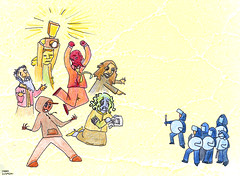The nation is collectively asking its police force and elected officials “what went wrong and what can we learn to prevent this from happening again?” Some feel that it is simply a lack of visible policing brought about by government cuts or an overreliance on CCTV; ten thousand extra police officers where on the streets of London on night of Tuesday the 9th and their presence was easily noticed. This might have been the main factor in putting an end to the escalation of the violence, but if it was, these numbers are clearly unsustainable and place huge demands on police forces outside London. There is a concern that changes to police practice are necessary to prevent rioting flaring up again. From what I have read in the news and on twitter and garnered from public opinion through conversations with friends and colleagues, I believe there are serious flaws in the changes the public is demanding and the logic that has been used to arrive at these conclusions.
A recent You Gov poll revealed some frightening statistics about the public’s support for change to police procedure. 90% of those polled supported the use of water cannons against rioters, 84% thought the use of mounted police would be appropriate, 82% thought a curfews should be imposed, 78% thought tear gas should be used, 77% approved of the army being sent in, 72% thought the police should be armed with tasers and 65% supported the use of plastic bullets. The most frightening statistics was the revelation that 33% of those polled support use of live ammunition against rioters. This means that one third of the public support the execution of at least some of those involved in the disturbance, as in such a situation deaths would be inevitable. As if another Bloody Sunday is what is needed to enforce the law, completely ignoring the fact that violent military state repression usually leads to extreme disenchanment with the government and increasingly violent uprisings.

Many feel that the lack of consequences for the initial acts of rioting and looting is what caused it to spread. I have heard a lot of endorsements for giving police license to ‘crack some heads’, and all that was needed to restore order was for the authorities to turn a blind eye to police brutality. At the root of this is the simplistic belief of a dividing line between right and wrong and that if you receive a beating from a police officer you must have done something to deserve it. The same applies to those who support the use of water cannons. There is a black and white view that if someone is hurt by a water cannon (even a bystander) that they must be a dangerous criminal. Aside from the implications for innocent people in the wrong place at the wrong time, beating down the angry, alienated and disaffected members of society will only foster greater resentment, perpetuate marginalisation and encourage those effected to rise up stronger and with more violence.
I take serious issue with the belief that the problem with the police in this country is that they are not violent enough. The notion that a system of fear, beatings, and aggressive repression is the best way to keep the populace in line is backed up by the immortal phrase ‘if you have done nothing wrong then you have nothing to fear,’ which only translates to ‘if you are white and middle class you have nothing to fear’. This view goes hand-in-hand with the wide spread but unspoken opinion that our society is not cruel enough to the poor, and that if we were stricter and more repressive then rioting would be less likely. The logic behind this is clearly flawed.
Last year’s G20 protests are frequently brought up this context, where a man died through police action at a legitimate protest – a man who was not even part of the protest but a passer-by. Apologists for police brutality seem to claim that it was wrong and detrimental to public order to investigate the cause of this death. Another pillar to this argument is the view that society has given too many rights to criminals, which has crippled police action. In the context of recent events, where the police shot and killed a man who it has emerged did not fire at them, this seems unlikely. Also if it is true that we are too liberal in giving away rights then this casts serious ideological doubt on the variety of western democracy we are attempting to export to authoritarian countries like China and North Korea. Proponents of heavy handed policing inadvertently relay express praise for the way the Chinese security services dealt with the Tiananmen Square Massacre. I personally have taken immense pride that our police force exercises much more restraint than police forces in authoritarian countries, and indeed those in other western countries like Greece or America where violent uprisings are much more common.
We need to learn important lessons from this but we must not lose what make us one of the freest and most peaceful societies on earth, with a police force respected throughout the world for their calm and restraint. It is these characteristics which have kept our cities relatively disturbance-free until recently and have prevented greater loss of life. In closing I would like to add a quick note to those who deny that there are larger forces at work in this issue and believe there is nothing more to this than opportunistic criminality. To suggest that there is not a socio-economic root to the riots is to suggest something very dark about the nature of humanity and to imply that for a few days we were suffering from a mass outbreak of sociopathy. This is also is a spurious claim.

No comments:
Post a Comment